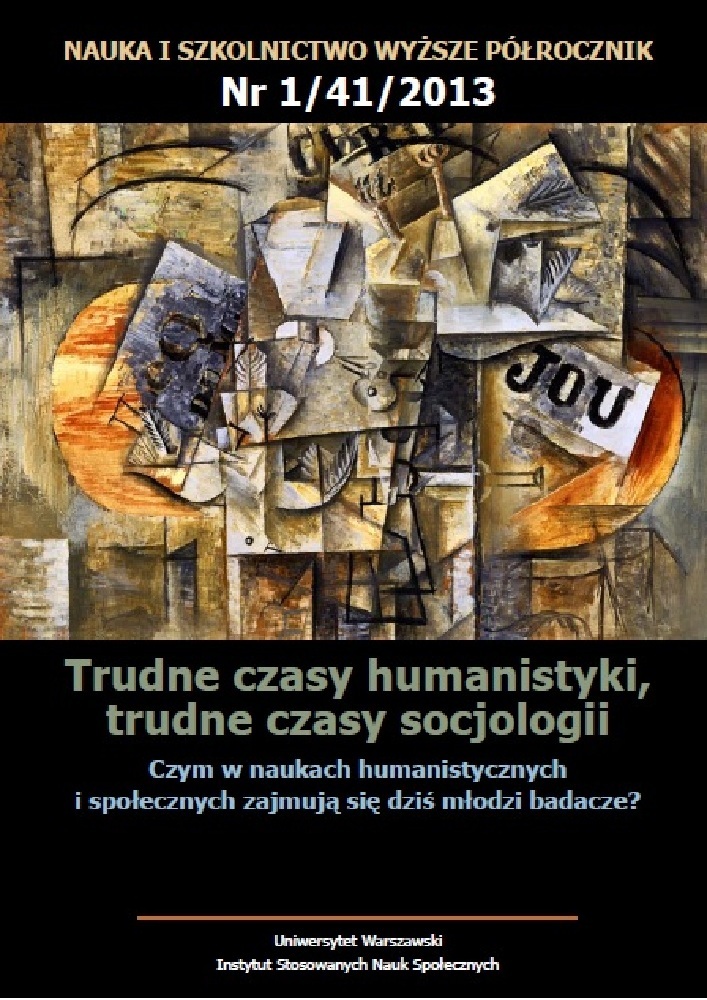Abstract
New technologies consistently and inevitably changing our reality. It also occurs due to increasing quantities of generated data and its new types. A large part of that data is a valuable product, suitable for use in analytical and research projects. Especially Internet technologies have great potential conducive to the development of social research. There are also developing widely available statistical and analytical tools. The problem that remains is the lack of highly qualified and interdisciplinary educated analysts and researchers. This applies particularly to those who freely combine IT and programming competences with analytical and statistical skills and with a deep, humanistic understanding of social problems. However, there are already examples of successful combination of new technology and statistical methods in the service of social studies, that have a huge potential in providing key data for the purpose of conducting innovative research and development of evidence-based policies.References
ALEKS 2012, Aleks. Course Products [on-line], Dostępne w Internecie: http://www.aleks.com/about_aleks/course_products
Bendyk E. 2012, Punkt przełomu. Trendy rozwojowe o zasięgu globalnym i regionalnym, Warszawa: MGG Conferences
Bicheno S. 2012, Global Smartphone Installed Base Forecast by Operating System for 88 Countries 2007 to 2017, Strategy Analytics.
COURSERA 2012a, Coursera [on-line]. Dostępne w Internecie:
https://www.coursera.org/about/pedagogy
COURSERA 2012b, American Council on Education to Evaluate Credit Equivalency for Coursera’s Online Courses [on-line]. Dostępne w Internecie: http://blog.coursera.org/post/35647313909/american-council-on-education-to-evaluate-credit
Das M. 2012, Innovation in online data collection for scientific research: the Dutch MESS project, ”Methodological Innovations Online” 2012, 7(1)
DATA.GOV 2012, DATA.GOV. An Official Web Site of the United States Government [on-line]. Dostępne w Internecie: http://www.data.gov
EUROSTAT 2012, Households having access to the Internet, by type of connection, European Commision. Dostępne w Internecie: http://epp.eurostat.ec.europa.eu/portal/page/portal/information_society/data/main_tables
Gasper T. 2012, Big Data Right Now: Five Trendy Open Source Technologies [on-line], TechCrunch. Dostępne w Internecie: http://techcrunch.com/2012/10/27/big-data-right-now-five-trendy-opensource-technologies/
GatesFundation 2012, Massive Open Online Courses (MOOCs) [on-line], Bill&Melinda Gates Fundation. Dostępne w Internecie: http://www.gatesfoundation.org/postsecondaryeducation/Pages/massive-open-online-courses.aspx
IDC 2012, Worldwide and U.S. Mobile Applications Download and Revenue 2012–2016 Forecast: The Appification of Everything Goes Global, International Data Corporation.
ITU 2005, The Internet of Things. ITU Internet Reports 2005. Executive Summary, Geneva: International Telecommunication Union
ITU 2012, Measuring the Information Society, Geneva: International Telecommunication Union
Kaczmarek-Kurczak P. 2012, Mistrzowie nawigacji, „Polityka”, nr 2(2). Poradnik psychologiczny Polityki. Tom 9
Lewin T. 2012, Collece of Future Could be Come one, Come All [on-line], ”The New York Times”. Dostępne w Internecie: http://www.nytimes.com/2012/11/20/education/colleges-turn-to-crowdsourcing-courses.html?pagewanted=all&_r=0
LISS 2012a, CentERdata. Institute for data collection and research. LISS Panel [on-line]. Dostępne w Internecie: http://www.lissdata.nl/lissdata/
LISS 2012b, LISS Panel. Data Archive [on-line]. Dostępne w Internecie: http://www.lissdata.nl/dataarchive/
LISS 2012c, LISS Panel. About the Panel [on-line]. Dostępne w Internecie: http://www.lissdata.nl/lissdata/About_the_Panel
LISS 2012d, LISS Panel. Proposals. Approval rate [on-line]. Dostępne w Internecie: http://www.lissdata.nl/lissdata/Proposals/Approval_Rate
Manyika J., Chui M., Brown B., Bughin J., Dobbs R., Roxburgh Ch., Hung Byers A. 2011, Big data: The next frontier for innovation, competition, and productivity, McKinsey Global Institute.
Markham A., Buchanan E. 2012, Ethical Decision-Making and Internet Research: Version 2.0. Recommendations from the AoIR Ethics Working Committee. Final Draft, Association of Internet Researchers.
McLoone J. 2012, Code Length Measured in 14 Languages [on-line], Wolfram Blog. Dostępne w Internecie: http://blog.wolfram.com/2012/11/14/code-length-measured-in-14-languages
Muenchen R. A. 2009, R for SAS and SPSS Users, New York: Springer
Muenchen R. A. 2012, The Popularity of Data Analysis Software [on-line]. Dostępne w Internecie: http://r4stats.com/articles/popularity
Nadolny M. 2012, Data Economy. Gospodarka oparta na danych, Trendy rozwojowe i zmiany gospodarcze w regionie, Warszawa: MGG Conferences
NIC 2008, Disruptive Civil Technologies. Six Technologies With Potential Impacts on US Interests Out to 2025, Prepared by SRI Consulting Business Intelligence under the auspices of the National Intelligence Council, Conference report, CR 2008-07.
ODI 2012, Open Data Institute. Knowledge for everyone [on-line]. Dostępne w Internecie: http://www.theodi.org/
Revolution Analytics 2012, The Rise of Data Science in the Age of Big Data Analytics: Why Data Distillation and Machine Learning Aren’t Enough [on-line], Revolution Analytics. Dostępne w Internecie: http://www.revolutionanalytics.com/news-events/free-webinars/2012/rise-of-data-science
Rexer Analytics 2011, 5th Annual Rexer Analytics Data Miner Survey [on-line]. Dostępne w Internecie: http://rexeranalytics.com/Data-Miner-Survey-Results-2011.html
Rickert J. 2011, Big Data Analysis with Revolution R Enterprise, Revolution Analytics.
R-Project 2012, R News. Changes in R Version 2.15.2 [on-line]. Dostępne w Internecie: http://cran.r-project.org/src/base/NEWS.html
Scherpenzeel A., Sonck N., Fernee H. 2012, Time use data collection using Smartphones: Results of a pilot study among experienced and inexperienced users, 6th Internet SurveyMethodology Workshop, Ljublijana.
Smith D. 2010, R is Hot. How Did a Statistical Programming Language Invented in New Zealand Become a Global Sensation?, Executive White Paper, Revolution Analytics.
UDACITY 2012a, Udacity. Introduction to Statistics (ST101) [on-line]. Dostępne w Internecie: http://www.udacity.com/overview/Course/st101/CourseRev/1
UDACITY 2012b, Udacity Blog. Why a Functional Verification Course? [on-line]. Dostępne w Internecie: http://blog.udacity.com/2012/11/why-functional-verification-course.html
UK Cabinet Office 1999, Modernising Government. Presented to Parliament by the Prime Minister and the Minister for the Cabinet Office by Command of Her Majesty [on-line]. Dostępne w Internecie: http://www.archive.official-documents.co.uk/document/cm43/4310/4310.htm
Worldometers 2012, Worldometers. Real Time World Statistics [on-line]. Dostępne w Internecie: http://www.worldometers.info
